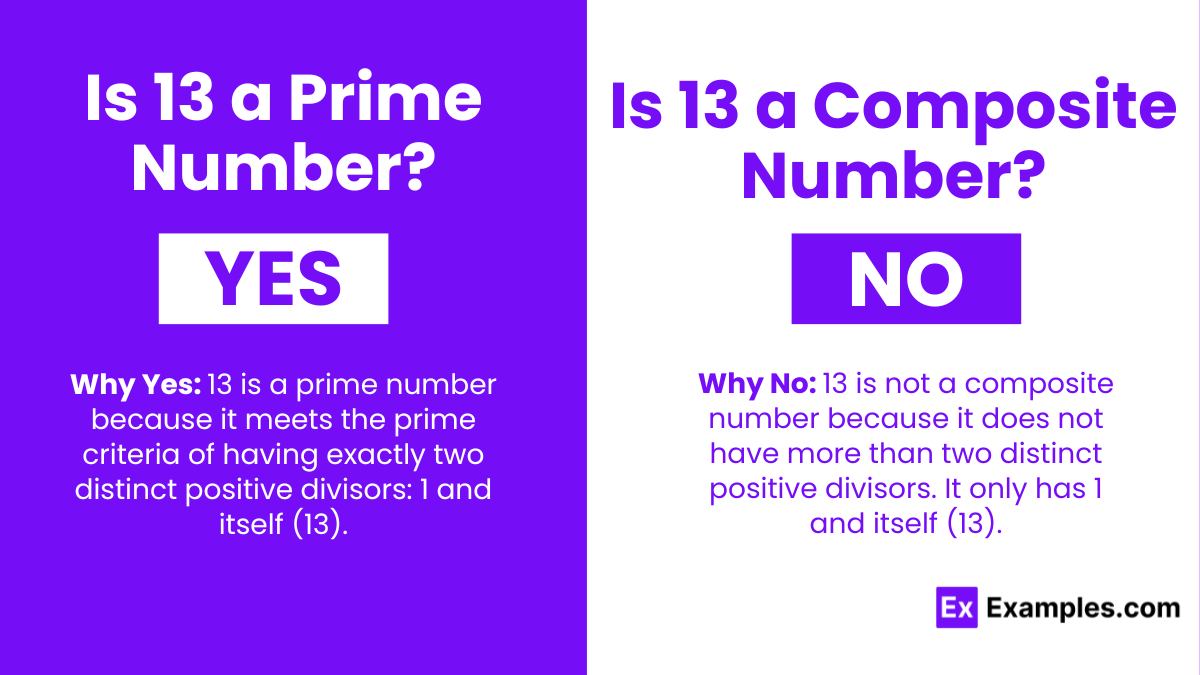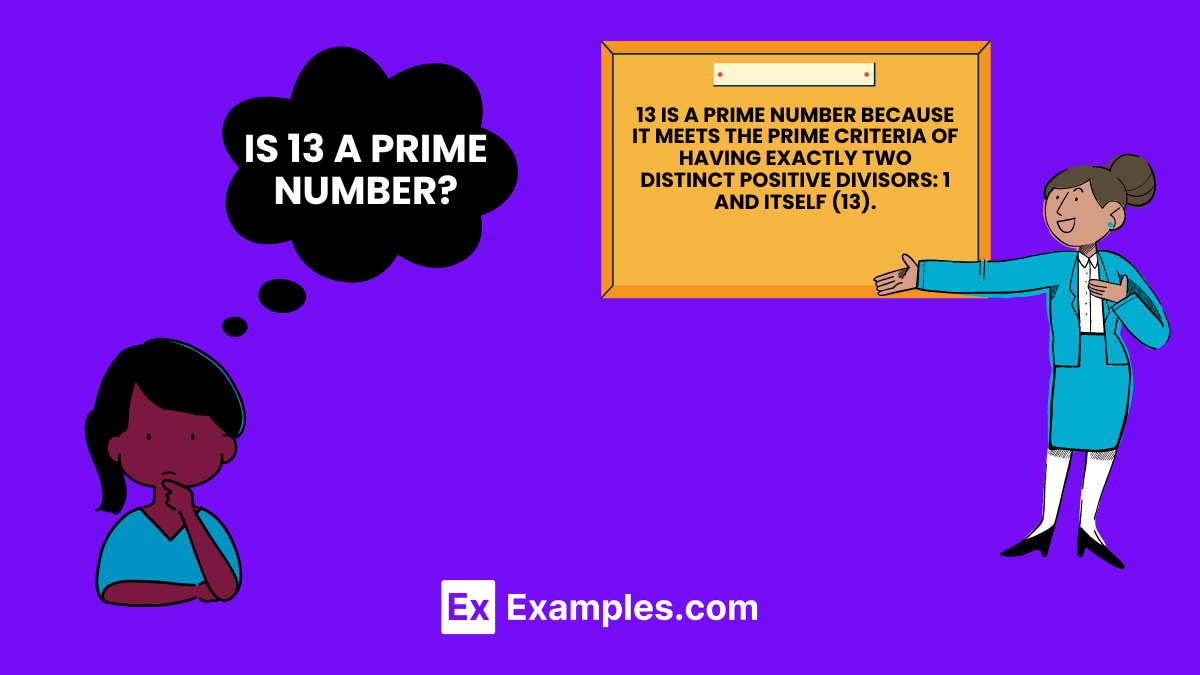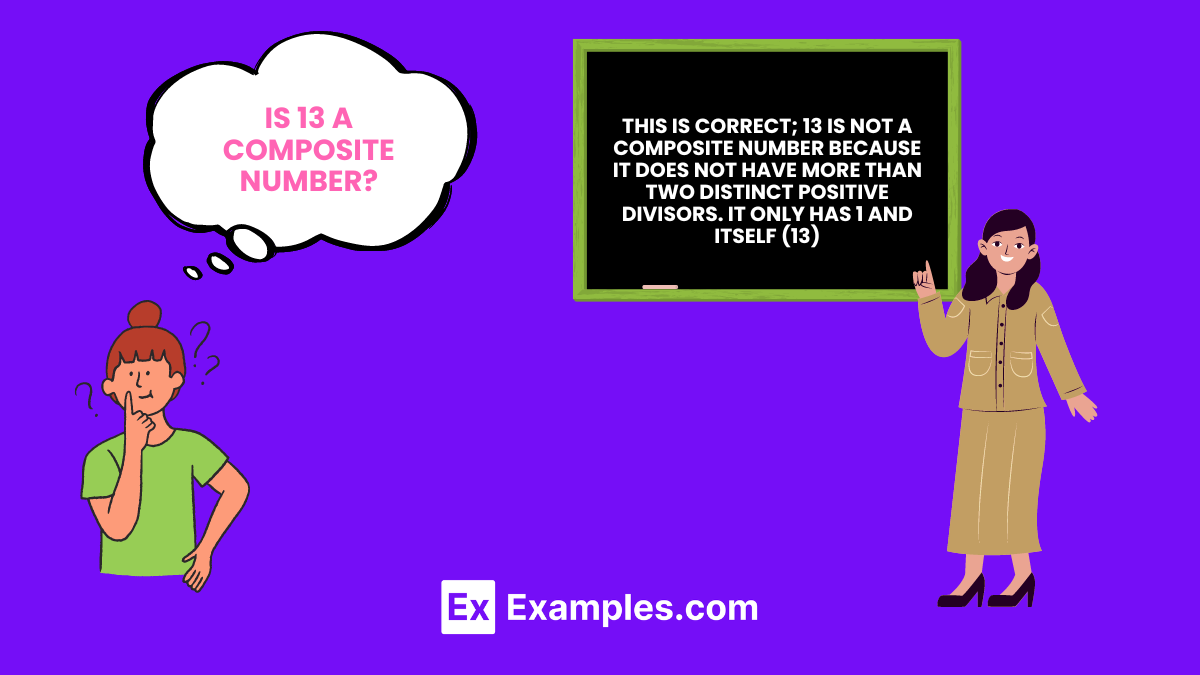Is 13 a prime number or a composite number?
Prime
Composite
Neither
Both


Yes – 13 is a prime number.
Why Yes: 13 is a prime number because it meets the prime criteria of having exactly two distinct positive divisors: 1 and itself (13). See any number if it’s prime number or not

NO – 13 is not a Composite Number
Why No: 13 is not a composite number because it does not have more than two distinct positive divisors. It only has 1 and itself (13).

| Property | Answer |
|---|---|
| Is 13 a prime number? | Yes |
| Is 13 a composite number? | No |
| Is 13 a perfect square? | No |
| Factors of 13 | 1, 13 |
| Multiples of 13 | 13, 26, 39, 52, 65, 78, 91, 104, 117, 130 |
| Cube Root of 13 | 2.35 |
| Square of 13 | 169 |
| Square Root of 13 | 3.61 |
| Is 13 a Perfect Square? | No |
| Is 13 a Perfect Cube? | No |
| Is 13 an Irrational number | No |
| Is 13 a Rational number | Yes |
| Is 13 a Real number | Yes |
| Is 13 an Integer | Yes |
| Is 13 a Natural number | Yes |
| Is 13 a Whole number | Yes |
| Is 13 an Even or odd number | Yes (13 is an odd number) |
| Is 13 an Ordinal number | Yes |
| Is 13 a Complex number | Yes (as all real numbers are also complex numbers) |
The factors of 13 are 1 and 13. 13 is not a square number, and it is only divisible by 1 and itself, showcasing its prime nature. There are no more factors of 13 beyond these.
13 is recognized as a prime number because it has exactly two divisors: 1 and itself (13). This characteristic distinguishes it from composite numbers, which have more than two divisors. The number 13, despite being considered unlucky in some cultures, holds a unique place in mathematics due to its prime status. Its significance extends beyond mathematics, reflecting its unique role in cultural, numerical, and conceptual frameworks.
Yes, in the UK or anywhere else, 13 is considered a prime number because it is only divisible by 1 and itself.
Text prompt
Add Tone
10 Examples of Public speaking
20 Examples of Gas lighting
Is 13 a prime number or a composite number?
Prime
Composite
Neither
Both
What classification does the number 13 fall into?
Prime
Composite
Complex
Undefined
Which of the following is true about the number 13?
It is a negative number.
It is a composite number.
It is a prime number.
It is a fraction.
In number theory, how is 13 categorized?
Composite
Complex
Imaginary
Prime
When determining if 13 is a prime number, what is the main criterion?
It must be divisible by 2.
It must be divisible by 3.
It must have exactly two distinct positive divisors.
It must be a negative number.
If you divide 13 by any number other than 1 and itself, what will the result be?
A whole number
Zero
A fraction
Undefined
Why is 13 considered a prime number?
It can be expressed as the product of two smaller numbers.
It has exactly two positive divisors.
It is divisible by 1, 2, and itself.
It is an even number.
What is the result of dividing 13 by any number other than 1 and itself?
1
13
A non-integer
Zero
Which statement is true about the number 13?
It can be factored into smaller natural numbers.
It is divisible by 2.
It is divisible only by 1 and itself.
It is an even number.
What happens when you try to find factors of 13 other than 1 and 13?
You get fractions.
You get whole numbers.
You get zero.
You get non-integers.
Before you leave, take our quick quiz to enhance your learning!

